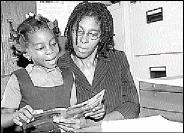Home has key role to play in literacy drive
Published: Wednesday | July 8, 2009

Top reader, six-year-old Gabrielle Salmon (left) shows off her reading skills to teacher and mother Lorna Salmon during May's Literacy Festival at the Green Island Primary, in Hanover
There is much evidence to indicate that a strong partnership between school and home contributes to students' literacy development and academic achievement. This is one of the underlying reasons for the renewed call by the Ministry of Education for stronger collaboration between schools and parents/caregivers.
Some schools have already established strong partnerships. However, schools which do not enjoy a robust partnership with the homes from which their students come must begin to consider ways of effectively engaging parents/caregivers in their children's literacy development. Such schools should consider specific things that parents can do to help in their children's achievement, as we believe that parents have the capacity to support their children's literacy development, even in the most basic ways.
Research-based suggestions
The following research-based suggestions are worth considering by school administrators:
It is important to make parents feel that they can make a meaningful contribution to their children's academic development.
Schools should develop techniques that make parents feel like a valued part of the school community.
Children should be encouraged and supported to identify ways that their parents/caregivers can be involved in their literacy development.
Children and adolescents can just as easily discourage or obstruct their parents' involvement in their school learning as they can encourage them.
Schools should be aware of factors that might impede home-school partnership, e.g. work commitments, poor skills in written and spoken English, family commitments, and negative experiences which parents/caregivers might have had as students.
Parents/caregivers must understand that proper nutrition and regular attendance impact students' literacy attainment and overall academic performance
It is important for parents to know that their contribution is valuable and they have a right to ask questions. The questions can sometimes be routed through the children as this helps to emphasise the place of each child in the home/child/teacher connection.
Parents should also be aware that, for a child to become a reader, he/she must become skilled in:
using language in conversation
listening and responding to stories read aloud
recognising and naming the letters of the alphabet
listening to the sounds of spoken language
connecting sounds to letters to figure out the 'code' of reading
reading often so that recognising words becomes easy and automatic
learning and using new words
understanding what is read.
The following tips for parents can make useful conversation points between teachers and parents:
Talk with your child often about their interests, family events, their friends, and activities at school. Ask questions to encourage your child to give details. Share with the child what you understand from the conversation with them.
Re-tell Stories
As you read or talk with your child, focus attention on new words and what they mean.
When reading with your young child, ask him/her to describe the pictures or illustrations and then point to words in the text that match the descriptions.
Make a list of new words, display the list at home, and encourage your child to use these new words repeatedly when talking and writing.
Label furniture, equipment and other items in the home.
Encourage your child to tell and re-tell stories. The stories can be ones that the child heard or ones that he/she might have read. Ask questions that focus on the characters, the message, and the beginning, middle and end of the story.
When reading with your child, encourage him/her to predict what might happen next in the story. Discuss actions in the story and compare them to the child's own experiences.
Encourage your child to write for different purposes (shopping lists, letters, stories, reports) and different audiences (family, friends, general public)
After your child has read a book, ask him to talk about the meaning of the book.
- Contributed by the Ministry of Education




















